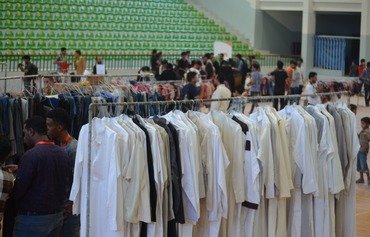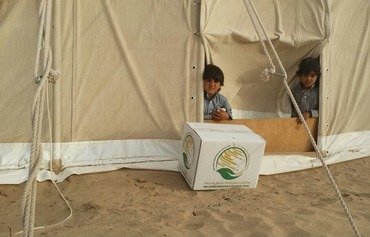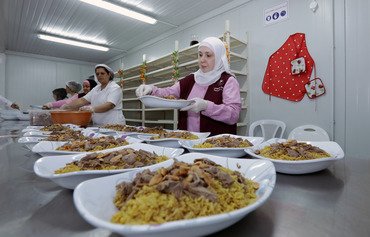Charitable organisations in Yemen have been working to brighten Eid al-Fitr for the children of poor or displaced families through the distribution of Eid clothing (kiswat al-Eid) in all provinces, officials and activists told Al-Mashareq.
The increased level of charitable activity this year demonstrates the solidarity that exists within Yemeni society and the sense of social responsibility people feel for bringing happiness to those in need amid difficult times, they said.
In Sanaa, the Yemeni Businesswomen Council, the Independent Yemen Youth Government, Yemen Food Bank and the Haidara Foundation for Peace and Human Development are among those distributing Eid clothing.
The distribution of clothing and humanitarian aid is focused on displaced families, the poor, the vulnerable and those most affected by the war.
In Aden province and other parts of Yemen, the UAE Red Crescent has been among a number of organisations distributing Eid clothing and other aid.
The Aden Foundation donated money that enabled 800 orphaned children to buy Eid clothing, while the Wadi Hadramaut Foundation and the co-operative Association in Seyoun distributed clothing in those areas.
Increase in charitable activity
"Charitable associations and organisations have obviously stepped up their efforts to distribute kiswat al-Eid," said Amin Jamaan, secretary-general of the Sanaa local council.
"This demonstrates the level of solidarity and compassion reached by Yemeni society," he told Al-Mashareq, adding that "the worse the situation gets because of the war, the higher the level of solidarity and compassion".
The increase in charitable activity "also reflects the acts of benevolence exhibited by community members", he said, noting that it is a social obligation to help families affected by the war, especially those who have been displaced.
Through the provision of funds, Yemenis "helped launch some of the activities by these organisations that targeted needy and displaced families, including sanitation workers", he said.
Eid clothing was distributed to 170 of the neediest families in Sanaa, Yemeni Businesswomen Council president Fawzia Nasher told Al-Mashareq.
Recipients were concentrated in a number of districts, including Wadi Ahmed, Khamsa wa Arbeen, Attan, al-Siyasi, al-Safiya and al-Balili, she said, noting that this activity was funded by a number of council members.
The displaced population and others affected by the war need the most help, Nasher said, calling for redoubled efforts to help these families and bring the joy and happiness of Eid to the hearts of their children.
Better co-ordination is needed
Initiatives that distribute aid are "an important activity" and one of the priorities of civil society organisations in times of heightened need, said Ministry of Social Affairs deputy director general of organisations Hameed Moawadah.
These initiatives function best, however, when they each operate within a specific geographic area, he told Al-Mashareq, and when they co-ordinate with each other with regard to the targeted recipients.
He criticised the chaotic nature of aid distribution in Sanaa, "whose population exceeds four million, on account of the disorganisation of the targeting of internally displaced persons (IDPs) and poor families".
This lack of co-ordination "results in double deliveries to some, while depriving some of the needy, IDPs and poor citizens", he said, calling for charities to work more closely with each other when they target a specific area.

![Members of the Yemeni Businesswomen Council distribute Eid clothing to children and families in Sanaa. [Photo courtesy of Yemeni Businesswomen Council]](/cnmi_am/images/2017/06/27/8533-Yemen-eid-clothing-600_384.jpg)







The displaced people in Hajda, Taiz province, are too many. They weren't included in the Eid assistance project this year.
Reply1 Comment(s)